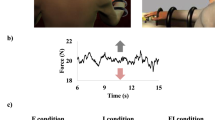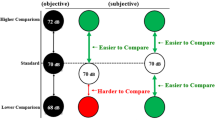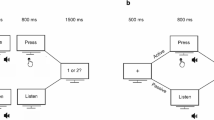Abstract
Motor executions alter sensory processes. Studies have shown that loudness perception changes when a sound is generated by active movement. However, it is still unknown where and how the motor-related changes in loudness perception depend on the task demand of motor execution. We examined whether different levels of precision demands in motor control affects loudness perception. We carried out a loudness discrimination test, in which the sound stimulus was produced in conjunction with the force generation task. We tested three target force amplitude levels. The force target was presented on a monitor as a fixed visual target. The generated force was also presented on the same monitor as a movement of the visual cursor. Participants adjusted their force amplitude in a predetermined range without overshooting using these visual targets and moving cursor. In the control condition, the sound and visual stimuli were generated externally (without a force generation task). We found that the discrimination performance was significantly improved when the sound was produced by the force generation task compared to the control condition, in which the sound was produced externally, although we did not find that this improvement in discrimination performance changed depending on the different target force amplitude levels. The results suggest that the demand for precise control to produce a fixed amount of force may be key to obtaining the facilitatory effect of motor execution in auditory processes.



Similar content being viewed by others
References
Aliu SO, Houde JF, Nagarajan SS (2009) Motor-induced suppression of the auditory cortex. J Cogn Neurosci 21:791–802. https://doi.org/10.1162/jocn.2009.21055
Baess P, Widmann A, Roye A et al (2009) Attenuated human auditory middle latency response and evoked 40-Hz response to self-initiated sounds. Eur J Neurosci 29:1514–1521. https://doi.org/10.1111/j.1460-9568.2009.06683.x
Baess P, Horváth J, Jacobsen T, Schröger E (2011) Selective suppression of self-initiated sounds in an auditory stream: an ERP study. Psychophysiology 48:1276–1283. https://doi.org/10.1111/j.1469-8986.2011.01196.x
Blakemore S-J, Wolpert DM, Frith CD (1998) Central cancellation of self-produced tickle sensation. Nat Neurosci 1:635–640. https://doi.org/10.1038/2870
Brainard DH (1997) The psychophysics toolbox. Spatial Vis 10:433–436. https://doi.org/10.1163/156856897X00357
Eliades SJ, Wang X (2003) Sensory–motor interaction in the primate auditory cortex during self-initiated vocalizations. J Neurophysiol 89:2194–2207. https://doi.org/10.1152/jn.00627.2002
Guenther FH, Hampson M, Johnson D (1998) A theoretical investigation of reference frames for the planning of speech movements. Psychol Rev 105:611–633. https://doi.org/10.1037/0033-295X.105.4.611-633
Horváth J (2014) The role of mechanical impact in action-related auditory attenuation. Cogn Affect Behav Neurosci 14:1392–1406. https://doi.org/10.3758/s13415-014-0283-x
Houde JF (1998) Sensorimotor adaptation in speech production. Science 279:1213–1216. https://doi.org/10.1126/science.279.5354.1213
Kaiser J, Schütz-Bosbach S (2018) Sensory attenuation of self-produced signals does not rely on self-specific motor predictions. Eur J Neurosci 47:1303–1310. https://doi.org/10.1111/ejn.13931
Kinoshita H, Furuya S, Aoki T, Altenmüller E (2007) Loudness control in pianists as exemplified in keystroke force measurements on different touches. J Acoust Soc Am 121:2959–2969. https://doi.org/10.1121/1.2717493
Kleiner M, Brainard D, Pelli D (2007) What’s new in Psychtoolbox-3. Percept 36:1–16. https://doi.org/10.1068/v070821
Kunde W (2001) Response-effect compatibility in manual choice reaction tasks. J Exp Psychol Hum Percept Perform 27:387–394. https://doi.org/10.1037//0096-1523.27.2.387
Macefield VG, Häger-Ross C, Johansson RS (1996) Control of grip force during restraint of an object held between finger and thumb: responses of cutaneous afferents from the digits. Exp Brain Res 108:155–171. https://doi.org/10.1007/BF00242913
Martikainen MH, Kaneko K, Hari R (2005) Suppressed responses to self-triggered sounds in the human auditory cortex. Cereb Cortex 15:299–302. https://doi.org/10.1093/cercor/bhh131
Mochida T, Kimura T, Hiroya S et al (2013) Speech misperception: speaking and seeing interfere differently with hearing. PLoS ONE 8:e68619. https://doi.org/10.1371/journal.pone.0068619
Morillon B, Hackett TA, Kajikawa Y, Schroeder CE (2015) Predictive motor control of sensory dynamics in auditory active sensing. Curr Opin in Neurobiol 31:230–238. https://doi.org/10.1016/j.conb.2014.12.005
Myers JC, Mock JR, Golob EJ (2020) Sensorimotor integration can enhance auditory perception. Sci Rep 10:1–13. https://doi.org/10.1038/s41598-020-58447-z
Neszmélyi B, Horváth J (2017) Consequences matter: self-induced tones are used as feedback to optimize tone-eliciting actions: self-induced tones used as feedback for actions. Psychophysiology 54:904–915. https://doi.org/10.1111/psyp.12845
Niziolek CA, Nagarajan SS, Houde JF (2013) What does motor efference copy represent? Evidence from speech production. J Neurosci 33:16110–16116. https://doi.org/10.1523/JNEUROSCI.2137-13.2013
Pelli DG (1997) The video toolbox software for visual psychophysics: transforming numbers into movies. Spat Vis 10:437–442. https://doi.org/10.1163/156856897X00366
Pfordresher PQ, Palmer C (2006) Effects of hearing the past, present, or future during music performance. Percept Psychophys 68:362–376. https://doi.org/10.3758/BF03193683
Reznik D, Henkin Y, Schadel N, Mukamel R (2014) Lateralized enhancement of auditory cortex activity and increased sensitivity to self-generated sounds. Nat Commun 5:1–11. https://doi.org/10.1038/ncomms5059
Reznik D, Henkin Y, Levy O, Mukamel R (2015) Perceived loudness of self-generated sounds is differentially modified by expected sound intensity. PLoS ONE 10:e0127651. https://doi.org/10.1371/journal.pone.0127651
Sams M, Möttönen R, Sihvonen T (2005) Seeing and hearing others and oneself talk. Cogn Brain Res 23:429–435. https://doi.org/10.1016/j.cogbrainres.2004.11.006
Sato A (2008) Action observation modulates auditory perception of the consequence of others’ actions. Conscious Cogn 17:1219–1227. https://doi.org/10.1016/j.concog.2008.01.003
Tian X, Poeppel D (2010) Mental imagery of speech and movement implicates the dynamics of internal forward models. Front Psychol. https://doi.org/10.3389/fpsyg.2010.00166
Timm J, SanMiguel I, Keil J et al (2014) Motor intention determines sensory attenuation of brain responses to self-initiated sounds. J Cogn Neurosci 26:1481–1489. https://doi.org/10.1162/jocn_a_00552
Weiss C, Schütz-Bosbach S (2012) Vicarious action preparation does not result in sensory attenuation of auditory action effects. Conscious Cogn 21:1654–1661. https://doi.org/10.1016/j.concog.2012.08.010
Weiss C, Herwig A, Schütz-Bosbach S (2011) The self in action effects: selective attenuation of self-generated sounds. Cognition 121:207–218. https://doi.org/10.1016/j.cognition.2011.06.011
Wolpert DM, Flanagan JR (2001) Motor prediction. Curr Biol 11:R729–R732. https://doi.org/10.1016/S0960-9822(01)00432-8
Wolpert DM, Ghahramani Z, Jordan MI (1995) An internal model for sensorimotor integration. Science 269:1880–1882. https://doi.org/10.1126/science.7569931
Zatorre RJ, Chen JL, Penhune VB (2007) When the brain plays music: auditory–motor interactions in music perception and production. Nat Rev Neurosci 8:547–558. https://doi.org/10.1038/nrn2152
Acknowledgements
This study was partially supported by a Grant-in-Aid for Japan Society for the Promotion of Science Fellows 20J14743 awarded to NE; research grants from the National Institute on Deafness and Other Communication Disorders Grant R01-DC017439 awarded to TI; JSPS KAKENHI Grant numbers 17H00753 and 17H06344 awarded to KW; JST CREST JPMJCR14E4 and JPMJCR16E1 awarded to KW and KN; JSPS KAKENHI Grant number 18H04082 awarded to KN.
Author information
Authors and Affiliations
Corresponding author
Additional information
Communicated by Francesca Frassinetti.
Publisher's Note
Springer Nature remains neutral with regard to jurisdictional claims in published maps and institutional affiliations.
Rights and permissions
About this article
Cite this article
Endo, N., Ito, T., Mochida, T. et al. Precise force controls enhance loudness discrimination of self-generated sound. Exp Brain Res 239, 1141–1149 (2021). https://doi.org/10.1007/s00221-020-05993-7
Received:
Accepted:
Published:
Issue Date:
DOI: https://doi.org/10.1007/s00221-020-05993-7




